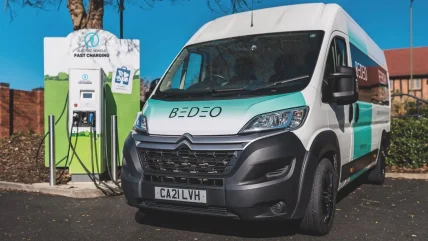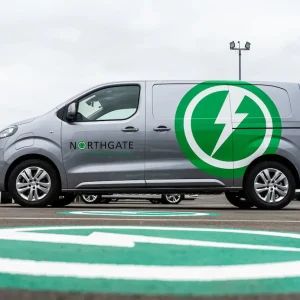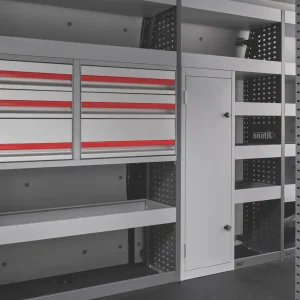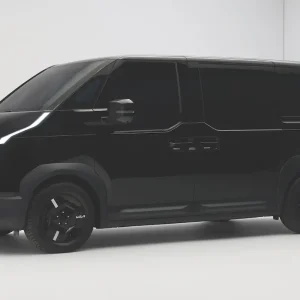
Founded as BD Auto in 2009, electric drivetrain specialist BEDEO cut its teeth converting compact vans to electric power.
When manufacturers started making compact electric vans in-house from 2015 it switched its focus to large BEV conversions, leading to an approach from the PSA Group in 2017 that resulted in a partnership and the launch of the Citroën e-Relay, Peugeot e-Boxer and Vauxhall Movano-e at the 2019 Commercial Vehicle Show. But with Stellantis having taken over PSA and announced its intention to produce its own large electric vans, it was time for BEDEO to change direction again and in September 2023 the firm revealed a retrofit solution (RE-100) to convert diesel vans into diesel-electric hybrids. It joins the firm’s Reborn Electric range, which also includes full BEV conversions.
BEDEO owner and CEO Osman Boyner says he spotted an opening in the used market “to fill the needs of large van owners” who could either not afford to transition to new BEVs or for whom they would not meet their operational requirements.
“Electric vans today don’t meet the needs of the market [in terms of range] and even Euro 6 diesel vans are responsible for a disproportionate amount of carbon emissions,” he said. “With the RE-100 we have created a new category of hybrid that not only meets the needs of the market but also accelerates transport decarbonisation.”
“While sustainability is, of course, a key driver, the end-to-end sustainability (the whole life cycle) of the vehicle also needs to be taken into account,” Boyner added.
“It cannot be sustainable to replace a vehicle that has not reached the end of its useful working life, [nor] is it sustainable to replace not only the vehicle but also the refrigeration units or bespoke fit-outs that many of these vehicles have.”
Boyner argues that retrofitting diesel vans with electric capability overcomes these challenges by reducing emissions in city centres – where last-mile deliveries take place – and by extending the life cycles of older vans.
The RE-100 range extender uses in-wheel motor (IWM) technology to provide a claimed electric range of 73 miles, with the original diesel mode used for longer, extra-urban journeys. The two IWMs are fitted to the rear axle and are powered by a 37kWh battery. Boyner claims the motors are smaller, lighter and easier to install than an e-axle. They also require no suspension modifications to front or rear, meaning ground clearance and load height are unaffected.
With geo fencing activated, Boyner says RE-100 vans automatically switch to electric power when entering a LEZ. Outside of controlled zones, the driver can change between electric and diesel modes – but Boyner predicts 90% of journey time will be in electric mode.
Today, BEDEO can retrofit the Stellantis stable of large vans: Peugeot Boxer, Citroën Relay, Fiat Ducato and Vauxhall Movano, but it plans to spread the net to cover all large vans.
Bedeo has not revealed prices for vans fitted with the RE-100 but Boyner insists “the price point is not major – it’s roughly like a new diesel”.
Although RE-100 enables zero-emission urban motoring, in cost terms the advantage is less clear. Euro 6 diesel vans, which in 2023 could be up to eight years old, are permitted to enter London’s Ultra Low Emission Zone (ULEZ) without charge anyway and as yet there is no legislation in the UK that recognises older vans retrofitted to run on electric power. So, for example, they are not eligible for the Plug-in Van Grant (PiVG) but do have to pay the London congestion charge, which is set to be extended to all vehicles including EVs, from December 2025. The exemption from the charge for hybrids was withdrawn in October 2021.
“We need congestion charge exemption and continuation [of the c-charge] beyond 2025,” said Boyner. BEDEO is lobbying the government to recognise battery electric and range extender retrofitted vehicles legally, as is the case in France, for example.
He argues that while the PiVG does not offer a real incentive to operators to buy new electric large vans due to their prohibitively high purchase prices, it could make a real difference on more affordable retrofitted vans, particularly for small businesses.
In technological terms, BEDEO has historically moved to stay ahead of the curve – but a new challenge could be on the horizon with OEMs introducing their own retrofit schemes.
BEDEO’s former partner Stellantis, for example, has announced it will launch a retrofit programme in 2024.
The ball is back in BEDEO’s court but as Boyner said: “We are trying to lead this business.”





